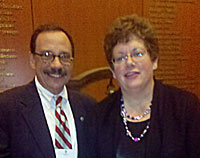Sifting and Winnowing in New York City
Testimonial: Robert Beecher ’69, political science
Wednesday, September 29, marked the beginning of the newly created Chancellor’s Series: Meeting of the Minds. This event was held at the Morgan Library & Museum in Midtown Manhattan, and featured distinguished faculty and UW-Madison Chancellor Biddy Martin as the gracious host and moderator.

Robert Beecher with Chancellor Martin
About 160 alumni and guests attended this thoroughly enjoyable and enlightening evening on the campus of the elegant library. The library galleries were open for attendees throughout the evening.
Although I was born and raised in New York, I had never had the pleasure of visiting the Morgan Library. Shame on me! Originally an intimate palazzo-like structure designed by Charles Follen McKim to serve as the private library of financier Pierpont Morgan, today it is a magnificent complex of buildings of differing styles and periods covering half of a city block. In 1924, J. P. Morgan, Jr. gave his father's extraordinary library to the public.
A more impressive setting for an evening of lively discourse could hardly have been selected. Kudos to the event planners, and thanks to the Wisconsin Alumni Association and the University of Wisconsin Foundation for their support!
Arriving shortly after 5:30 p.m., I had the opportunity to chat with Paula Bonner and meet Stephen J.A. Ward, professor of journalism and mass communications, one of four distinguished UW faculty panelists. Catching up and small talk amongst the arriving guests continued through a scrumptious cocktail hour. Yes! Open bar! Perfect food, with a nod to the Wisconsin foodies in the form of fried mac-and-cheese nuggets passed around by the wait staff. Whether or not Lipitor was available, I cannot say.
Cocktails, chatting, and chewing gave way to the main event in the ample auditorium.
Already impressed, imagine my reaction when the discussion started and we were bathed in the bright intellectual light of our panelists: Ward; Barry Burden, professor of political science; Tracey Holloway, associate professor of environmental studies and director of the Nelson Institute Center for Sustainability and the Global Environment; and Joel Rogers, professor of law, political science and sociology, and director of the Center on Wisconsin Strategy.
Chancellor Martin’s introductory remarks and syllabus bios of our panelists would whet the appetite for what was to come. And what a treat! I had just consumed delish appetizers, caught up with old friends, and was about to be treated to a smorgasbord of insight served up by some pretty sharp folks.
Professor Rogers, droll, concise, and knighted the “resident pessimist” of the panel by Chancellor Martin, served up his views on the ”… incredibly dysfunctional character of American politics.” All on the panel remarked on the lunacy (my word, sorry) that characterizes the current political train wreck that is American politics. And back and forth it went, with Professor Burden supplementing Professor Rogers’s observations with his own insights into the realities of the franchise. Who would have thought, he asked, that all of the efforts to make voting as convenient as turning on your lights, or computer, or cell phone, would in fact result in lower voter turnout? Indeed, it now appears that the electorate’s energy to go to the polls is actually tapped out when Election Day arrives. Ah, the advantages of the empirical study! Could have fooled me.
Conventional wisdom was again challenged by Professor Holloway, who, among other insights, shared with us the fact that research she and her students have conducted has led to the conclusion that the law of unintended consequences often frustrates otherwise seemingly commonsensical solutions to environmental problems. I am sure most of us in the room simply assumed that national environmental solutions mandated by the Clean Air and Water Act(s) were the way to go. Well, it ain’t necessarily so, according to Professor Holloway. The examples she provided of the need for coordinated solutions to pollution and climate change, as opposed to singling out a single area, were so obvious –– once explained.
Of course, much of the discussion was devoted to the viral, often puerile, and utterly confusing state of affairs that is modern media. I have often wondered how we exist rationally in such a media-saturated environment. Professor Ward stressed the need for responsibility in media today and the ethical obligations of the media globally — getting it right and doing it right.
The sifting and winnowing component of the evening got going in earnest when the audience offered questions and comments. How many attendees were transported back to the days — now long ago for some of us — when this type of challenging discourse was routine?
It was the perfect synthesis of academia and world issues. And should I mention that the coffee and deserts were yummy?
